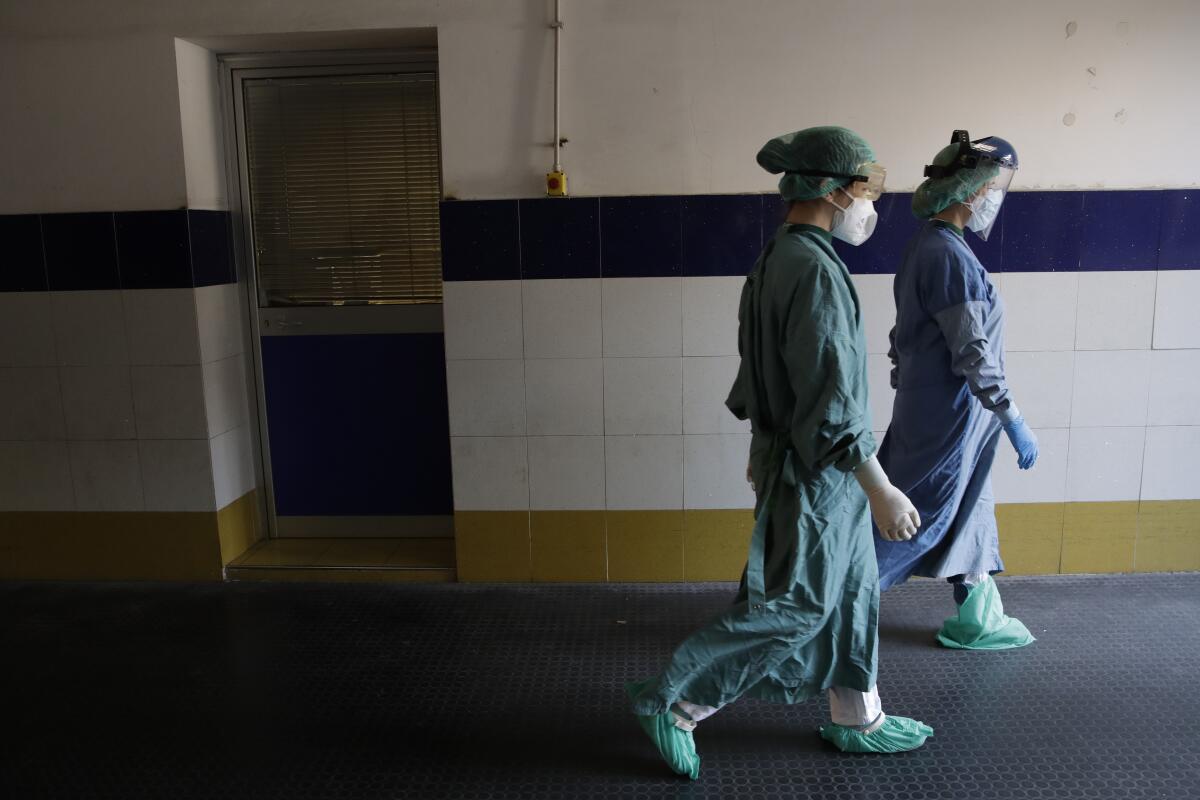Most of Italy’s doctors and nurses are women. Its official coronavirus response is dominated by men

ROME — Every evening, when health experts updated anxious Italians in televised briefings about their nation’s devastating coronavirus outbreak, the lineup of authoritative figures included only one woman: the sign-language interpreter.
And not a single woman was among the 20-member commission appointed to advise the government on how and when Italy could safely reopen its factories, stores, schools and parks.
The omissions are all the more glaring because more than half the country’s doctors and three-quarters of its nurses are women, many on the front lines of the pandemic. Not to mention that the three researchers who isolated the coronavirus in the first days of Italy’s outbreak were women.
Indignation over the gender inequality has now exploded into the open, with some 70 female researchers and scientists signing a petition demanding that the government include women in virus decision-making bodies as a matter of “democracy and civilization.”
Italy Easing Lockdown
Backing them is a grass-roots movement on social media dubbed “Give Us Voice” — a riff on the token presence of the female sign-language interpreter at the news conferences.
A motion has also been lodged in the Senate by 16 female lawmakers calling on the government to remedy the imbalance. Dozens of women in Parliament’s lower Chamber of Deputies backed a similar motion, declaring such slogans as “Let’s make ourselves heard.”
This week, Prime Minister Giuseppe Conte acknowledged the appeals, calling on the head of the commission of scientific and technical experts advising the government on reopening to enlist women into their ranks. He urged his Cabinet ministers to “keep gender equilibrium in mind” in setting up task forces.
“We’re happy to have contributed to repairing a glaring error,” said Sen. Emma Bonino, who has battled for decades in Italy for women’s rights.
But Italian women’s concerns go beyond pandemic panels. Women are worried that the closure of schools until at least September, coupled with cultural attitudes stacked in favor of men, will push them even further behind in the workforce.
Ready for post-bimbo era in Italy
According to 2018 European Union figures, 53% of Italian women were in their nation’s workforce, compared with 73% of men. Only Greece ranked lower among EU nations: 49% for women and 70% for men.
Scarcity of affordable day care and men’s rejection of domestic responsibilities such as housework have been blamed for decades for Italian women’s inability or reluctance to join the workforce.
When Conte explained to the nation how Italy would gradually emerge from lockdown, “he never said the words ‘family,’ ‘children,’ ‘school’ until a journalist asked him,” noted Irene Fellin, a senior researcher on gender and security at the International Affairs Institute, a Rome-based think tank.
Conte’s lack of focus on the child-care burden on women in the months ahead is “one of the reasons it was so important to have a woman on the commission” advising the government on reopening, said Dr. Paola Romagnani, a kidney specialist who signed the petition calling for women’s inclusion.
In some European countries, such as Sweden, middle and elementary schools as well as nursery schools have remained open during the pandemic. In France, heavily stricken by COVID-19, the government is preparing for a staggered reopening of schools starting next week, when the country’s lockdown starts being eased.
“I’m sadly sure that in the short term there will be damage” to women’s slow progress in the Italian labor market, said Valeria Poli, a molecular biologist at the University of Turin, who also signed the petition. She expressed dismay that in 25 years the female presence in the Italian workforce had grown only 8%.
“If couples have to decide who goes back to work when they reopen the offices, it will be the women who won’t go back,” since many women work part time or are paid less than men, said Fellin, who also heads the Italian branch of Women in International Security.
As to why women were snubbed for visible roles during the pandemic, Romagnani pointed to the country’s centuries-old culture that attributes authoritativeness to men. As part of this legacy, until the early 1960s, women in Italy weren’t allowed to hold top positions at public companies, she noted.
Fellin agreed. “I don’t think that they think women aren’t competent. They just don’t see them,” she said.
More to Read
Sign up for Essential California
The most important California stories and recommendations in your inbox every morning.
You may occasionally receive promotional content from the Los Angeles Times.










